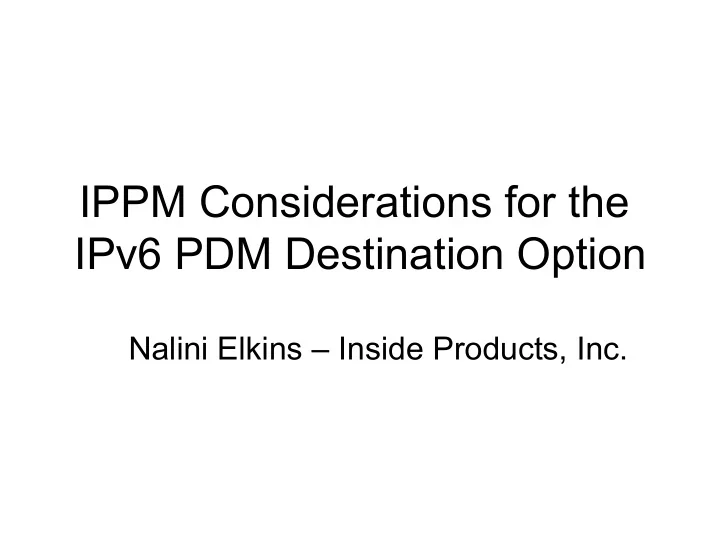

IPPM Considerations for the IPv6 PDM Destination Option Nalini Elkins – Inside Products, Inc.
We propose: Solution Requirement • Implementation of • In basic IP existing extension header: Destination transport Options Header (DOH) • Performance and • Undisturbed Diagnostic Metrics by middle (PDM) DOH systems
PDM • Performance and Diagnostic Metrics Destination Option (PDM) contains the following fields: (by 5- tuple) • PSNTP : Packet Sequence Number This Packet • PSNLR : Packet Sequence Number Last Received • DELTALR : Delta Last Received • DELTALS : Delta Last Sent • TIMEBASE : Base timer unit • SCALEDL : Scale for Delta Last Received • SCALEDS : Scale for Delta Last Sent
PDM Timing • No time synchronization needed • All times are in relation to self
Start Flow • Packet 1 is sent from Host A to Host B. The time for Host A is 10:00AM. • The time and packet sequence number are saved by Host A internally. The packet sequence number and delta times are sent in the packet.
Packet 1 Packet 1 Host A Host B PDM Contents: PSNTP : Packet Sequence Number This Packet: 25 PSNLR : Packet Sequence Number Last Received: - DELTALR : Delta Last Received: - DELTALS : Delta Last Sent: -
Keep in Host A • Internally, within the sender, Host A, it must keep: • Packet Seq. Number of last packet sent: 25 • Time the last packet was sent: 10:00:00
Keep in Host B • Packet 1 is received at Host B. Its time is set to one hour later than Host A. In this case, 11:00AM • Internally, within the receiver, Host B, it must note: • Packet Seq. Number of last packet received: 25 • Time the last packet was received : 11:00:03
Server Delay • Host B processes packet 1 and creates a response (packet 2). • Packet 2 is sent by Host B to Host A. • This is the time taken by Host B or Server Delay • Server Delay = Sending time (packet 2) - receive time (packet 1)
DeltaLR • We will call the result of this calculation: Delta Last Received • DELTALR = Sending time (packet 2) - receive time (packet 1) • Note, both sending time and receive time are saved internally in Host B. They do not travel in the packet. Only the Delta is in the packet.
Host B Stats • Within Host B is the following: • Packet Sequence Number of the last packet received: 25 • Time the last packet was received: 11:00:03 • Packet Sequence Number of this packet: 12 • Time this packet is being sent: 11:00:07 • DELTALR = 4 seconds (11:00:07 - 11:00:03) • DELTALR is Server Delay.
Packet 2 Packet 2 Host B Host A PDM Contents: PSNTP : Packet Sequence Number This Packet: 12 PSNLR : Packet Sequence Number Last Received: 25 DELTALR : Delta Last Received: 4 seconds DELTALS : Delta Last Sent: -
Metrics Needed • The metrics left to be calculated are end- to-end time and round-trip delay (network time). • This will be calculated by Host A when it receives Packet 2.
Packet 2 Received • Packet 2 is received at Host A. Remember, its time is set to one hour earlier than Host B. Internally, it must note: • Packet Sequence Number of the last packet received: 12 • Time the last packet was received : 10:00:12 • Note, this timestamp is in Host A time. It has nothing whatsoever to do with Host B time.
End-to-End Time • Now, Host A can calculate total end-to-end time. • End-to-End Time = Time Last Received - Time Last Sent • Packet 1 was sent by Host A at 10:00:00. Packet 2 was received by Host A at 10:00:12 • End-to-End time = 10:00:12 - 10:00:00 or 12 • This metric we will call DELTALS or Delta Last Sent
Network TIme • We can now also calculate round trip delay (network time). The formula is: • Round trip delay = DELTALS - DELTALR • Or: End-to-end time – Server Delay • Round trip delay = 12 - 4 or 8
How to Communicate? • Now, the only problem is that at this point all metrics are in Host A only and not exposed in a packet. • To do that, we need a third packet.
Packet 3 Packet 3 Host A Host B PDM Contents: PSNTP : Packet Sequence Number This Packet: 26 PSNLR : Packet Sequence Number Last Received: 12 DELTALR : Delta Last Received: 0 DELTALS : Delta Last Sent: 12 seconds
Breakout in WireShark
Timebase • Possible values of Time Base: • 00 - milliseconds • 01 - microseconds • 10 - nanoseconds • 11 - picoseconds
Scale (DLR / DLS) • 7-bit signed integer. • Possible values from -64 to +63. • Store most significant bits of timer value along with a scaling factor to indicate the magnitude. • High-order 16 bits.
Recommend
More recommend